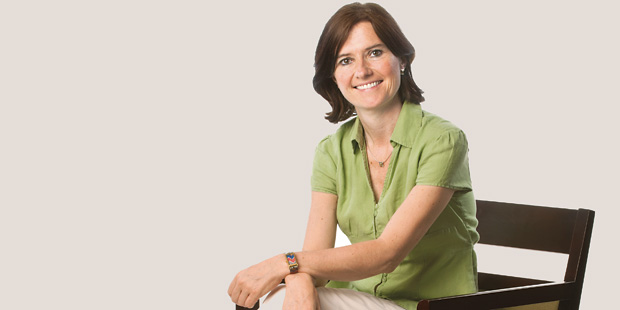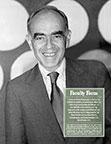Introducing Gráinne de Búrca
Professor of Law
Printer Friendly VersionOne of the foremost scholars on E.U. law and its relationship to national legal systems and the international legal order, Gráinne de Búrca has written or edited nine books and 50-plus articles and book chapters, and she edits the Oxford Studies in European Law book series. Her influential E.U. Law: Text, Cases, and Materials (fifth ed., 2011) has been in print since 1995. Throw the unusual name into the mix, however, and people “often expect to meet this wise old man, the Great Gráinne de Búrca,” says her friend Neil Walker from the University of Edinburgh. “Instead, they meet this chirpy young woman.”
NYU Law colleagues will have no such confusion, having already worked with de Búrca when she was a Hauser Global Visiting Professor in 2005 and Straus Inaugural Fellow in 2009–10. “Copies of her books sit open on desks from Moscow to Madrid,” says Murry and Ida Becker Professor of Law Benedict Kingsbury. “Her insights into every case, directive, proposal, and parliamentary position paper in the large and complex European legal system are acute and creative. She is a scholar who really knows her field and helps to shape it.”
De Búrca’s academic interests stem from a fascination with the E.U. itself. “Despite its current troubles, the E.U. remains one of the most successful examples of regional economic and political cooperation,” she says. Her work analyzes the kind of international actor the E.U. is becoming and whether lessons learned (both positive and negative) can be applied in other arenas of global governance.
In “The European Court of Justice and the International Legal Order After Kadi” (Harvard International Law Journal, 2010), she criticized the popular European Court of Justice decision that blocked the implementation of U.N. Security Council measures, freezing the assets of a Saudi businessman with alleged terrorist connections. De Búrca argues that the decision, along with recent ECJ case law, reveals an increasingly reserved and even skeptical approach to international law.
In “The Road Not Taken: The E.U. as a Global Human Rights Actor” (American Journal of International Law, 2011), de Búrca challenges the notion that the European Community in the 1950s was unconcerned with human rights protection. Delving into the archives, she finds that long-forgotten plans for the E.C.’s engagement with human rights were in many respects more ambitious than the current E.U. human rights system. De Búrca “has mastered not only the intricacies but all the subtleties of European Union law,” says George Bermann, director of European Legal Studies at Columbia Law School. “She is a meticulous and insightful scholar.”
One subject de Búrca doesn’t study, however, is status. Colleagues say she judges her peers’ work solely on merit, assesses that work generously even if its views contradict hers, and appears to be immune from strategizing. “She goes where she wants to go,” says Oxford’s Stephen Weatherill. “There’s never any sense of having an agenda.”
One might say de Búrca follows the Golden Rule. Having been, at age 23, one of the youngest fellows appointed to Oxford University, and a decade later the youngest professor—and one of the first female law professors—at the prestigious European University Institute in Florence, de Búrca is all the more impressive for emerging from humble beginnings.
De Búrca and her three siblings were raised in a strict household in suburban Dublin with an emphasis on education and discipline. Both her late father, Seán, and her mother, Bernadette, taught Gaelic. The children attended Gaelic-speaking public schools and spent summers with their dad’s family in a fishing village in the west of Ireland.
At her mother’s urging, de Búrca studied law at University College Dublin, graduating in 1986. The following year, she got an LL.M. from the University of Michigan, then returned to Dublin to become a Barrister-at-Law. In 1989 she got a one-year teaching position at Oxford, giving her an edge, she said, when a tenured post came her way. “It’s so often a matter of serendipity where people get their appointments,” she says modestly.
In 1998, she left Oxford to join the European University Institute—a graduate research institute set up by the founding members of the E.C.—“a dream for anyone interested in European law,” she says, and became the co-director of the Academy of European Law. There she met her husband, John Norton Pomeroy Professor of Law Philip Alston, who was then a professor at the EUI, then moved to the U.S., where she taught at Fordham Law School from 2006 to 2010 before joining the Harvard Law faculty.
Their two young children in tow, de Búrca and Alston visit Ireland often. “We have a running joke that my family doesn’t understand what academics do,” she says with a laugh. “My mother, to this day, thinks that once I’m done with my teaching, I’m on holiday. I have to justify my existence.” To her mother, maybe, but certainly not to the legal academy.
—


 Multimedia
Multimedia